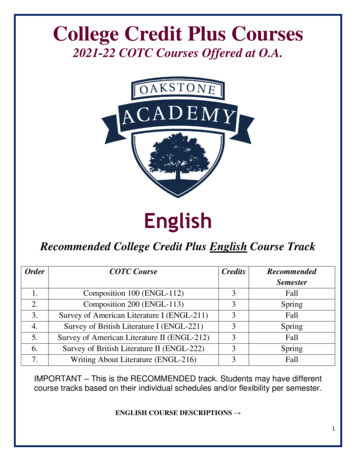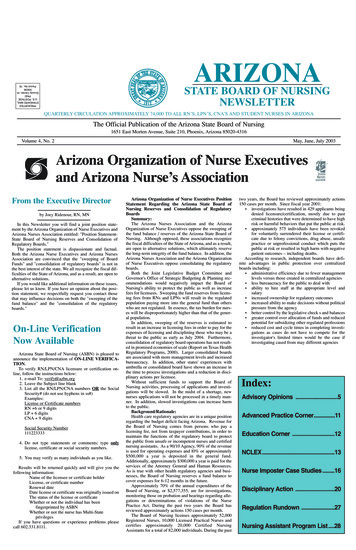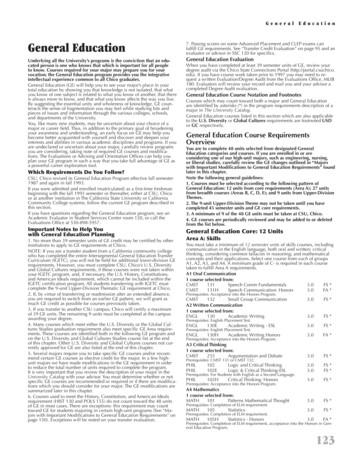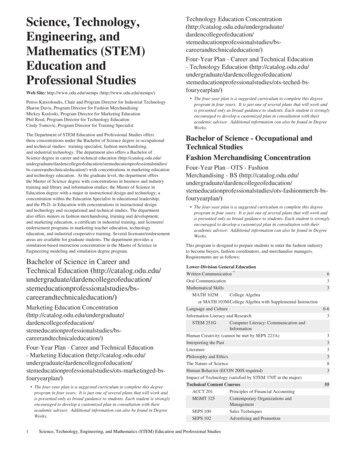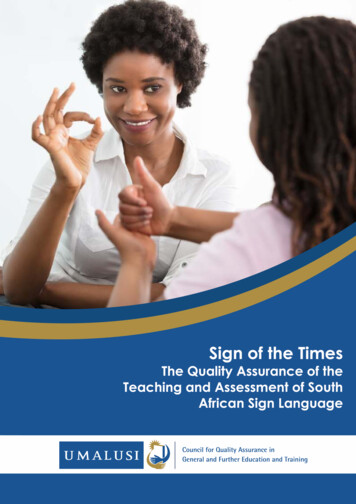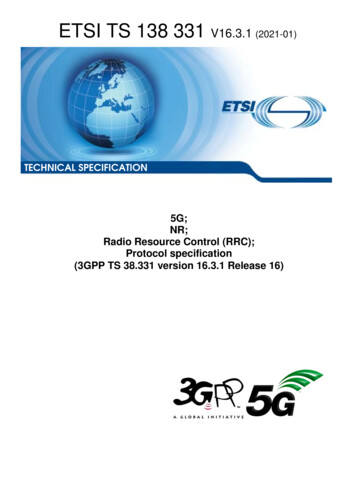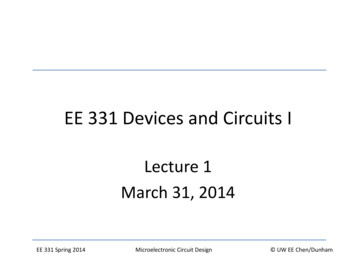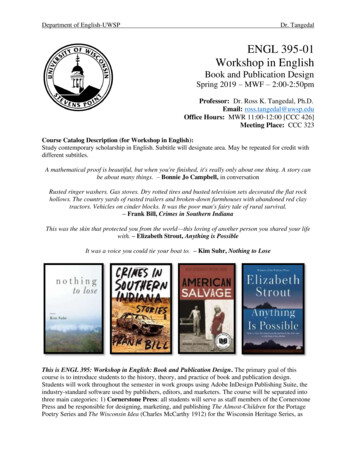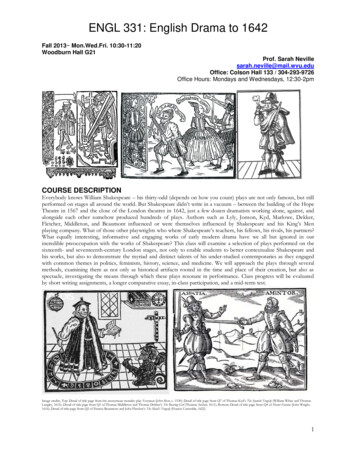
Transcription
ENGL 331: English Drama to 1642Fall 2013 Mon.Wed.Fri. 10:30-11:20Woodburn Hall G21Prof. Sarah Nevillesarah.neville@mail.wvu.eduOffice: Colson Hall 133 / 304-293-9726Office Hours: Mondays and Wednesdays, 12:30-2pmCOURSE DESCRIPTIONEverybody knows William Shakespeare – his thirty-odd (depends on how you count) plays are not only famous, but stillperformed on stages all around the world. But Shakespeare didn’t write in a vacuum – between the building of the HopeTheatre in 1567 and the close of the London theatres in 1642, just a few dozen dramatists working alone, against, andalongside each other somehow produced hundreds of plays. Authors such as Lyly, Jonson, Kyd, Marlowe, Dekker,Fletcher, Middleton, and Beaumont influenced or were themselves influenced by Shakespeare and his King’s Menplaying company. What of those other playwrights who where Shakespeare’s teachers, his fellows, his rivals, his partners?What equally interesting, informative and engaging works of early modern drama have we all but ignored in ourincredible preoccupation with the works of Shakespeare? This class will examine a selection of plays performed on thesixteenth- and seventeenth-century London stages, not only to enable students to better contextualize Shakespeare andhis works, but also to demonstrate the myriad and distinct talents of his under-studied contemporaries as they engagedwith common themes in politics, feminism, history, science, and medicine. We will approach the plays through severalmethods, examining them as not only as historical artifacts rooted in the time and place of their creation, but also asspectacle, investigating the means through which these plays resonate in performance. Class progress will be evaluatedby short writing assignments, a longer comparative essay, in-class participation, and a mid-term test.Image credits, Top: Detail of title page from the anonymous morality play Everyman (John Skot, c. 1530); Detail of title page from Q7 of Thomas Kyd’s The Spanish Tragedy (William White and ThomasLangley, 1615); Detail of title page from Q1 of Thomas Middleton and Thomas Dekker’s The Roaring Girl (Thomas Archer, 1611); Bottom: Detail of title page from Q4 of Doctor Faustus (John Wright,1616); Detail of title page from Q2 of Francis Beaumont and John Fletcher’s The Maid’s Tragedy (Francis Constable, 1622).1
TextsTexts for the majority of the plays we will study can be found in the course textbook: EnglishRenaissance Drama: A Norton Anthology, edited by David Bevington et al. (2002). Texts for themedieval/early Tudor drama we will study in week two and recommended secondary readings areavailable on e-reserve at the library. If you already own a Norton anthology from a previous Englishcourse, you may already have modernized copies of Everyman and the Second Shepherd’s Play. Anon, EverymanThe Wakefield Master, The Second Shepherd’s PlayRobert Greene, Friar Bacon and Friar BungayChristopher Marlowe, Doctor FaustusBenjamin Jonson, The AlchemistElizabeth Cary, The Tragedy of MariamJohn Fletcher, The Woman’s Prize, or, The Tamer TamedJohn Ford, ‘Tis Pity She’s a WhoreThomas Kyd, The Spanish TragedyFrancis Beaumont and John Fletcher, The Maid’s TragedyThomas Middleton, The Revenger’s TragedyThomas Dekker, The Shoemaker’s HolidayJohn Webster, The Duchess of MalfiFrancis Beaumont, The Knight of the Burning PestleASSIGNMENTS, summary 4 mini essays, 40% (10% each, one per theme) Short answer midterm exam 20% (Oct 4) Short essay final exams 20% (Dec 2 & 4; students must attend both days) Compare and Contrast Final Essay 20% (Part 1 due Nov 8; Part 2 due Dec 9)All the writing assignments and all the exams must be submitted in order to pass the course.SCHEDULEWeek 1 (Aug 19-21-23*): Early Modern Drama: Contexts and Vocabularies*last day to register for courses Required readings: “General Introduction” by Katharine Eisaman Maus and David Bevington(in your textbook, pp. xiii-lx) Recommended readings: “The Shakespearean Stage” by Andrew Gurr (on e-reserve)Week 2 (Aug 26-28-30) ORIGINS: Everyman and The Second Shepherd’s PlayWeek 3 (Sept 2*-4-6) MAGIC/SCIENCE: Robert Greene’s Friar Bacon and Friar Bungay* Labor Day: no class (Sept 2)Week 4 (Sept 9-11-13) MAGIC/SCIENCE: Christopher Marlowe’s Doctor Faustus
ENGL 331: English Drama to 1642Week 5 (Sept 16*-18-20) MAGIC/SCIENCE: Ben Jonson’s The Alchemist*Magic/Science mini-essay due (Sept 16)Week 6 (Sept 23-25-27*) THE WOMAN QUESTION: Elizabeth Cary’s Tragedy of Mariam*Reading day: no class (Sept 27)Week 7 (Sept 30-Oct 2-Oct 4*) THE WOMAN QUESTION: John Fletcher’s The Woman’sPrize, or, The Tamer Tamed*Midterm Exam (Oct 4)Week 8 (Oct 7*-9-11 ) THE WOMAN QUESTION: John Ford’s ‘Tis Pity She’s a Whore* Woman Question mini-essay due (Oct 7) Reading day: no class (Oct 11)Week 9 (Oct 14*-16-18) REVENGE TRAGEDY: Thomas Kyd’s Spanish Tragedy* Fall break: no class (Oct 14-15)Week 10 (Oct 21-23-25*) REVENGE TRAGEDY: Francis Beaumont and John Fletcher’sThe Maid’s Tragedy* Last day to drop a class (Oct 25)Week 11 (Oct 28*-30-Nov 1) REVENGE TRAGEDY: Thomas Middleton’s The Revenger’sTragedy* Revenge Tragedy mini-essay due (Oct 28)Week 12 (Nov 4-6-8*) SOCIAL CLASSES: Thomas Dekker’s Shoemaker’s Holiday* Compare and Contrast Essay, Part 1 due (Nov 8)Week 13 (Nov 11-13-15) SOCIAL CLASSES: John Webster’s Duchess of MalfiWeek 14 (Nov 18*-20-22) SOCIAL CLASSES: Francis Beaumont’s Knight of the BurningPestle* Social Classes mini-essay due (Nov 18)Week 15 (Nov 25-27-29): !!! Thanksgiving Recess: no class !!!Week 16 (Dec 2*-4*-6 ): Exams and Writing Tutorial* Final short exam days (Dec 2 & 4; students must be present at both days) Writing consultation day: no class (Dec 6)Week 17 (Dec 9*):* Compare and Contrast Essay, Part 2 due (Dec 9)* Last day to withdraw from the university (Dec 9)3
ENGL 331: English Drama to 1642POLICIESSee also: http://stapleyourpages.tumblr.com/Cell Phones and Laptop ComputersCell phones distract us from communicating fully with those immediately around us and must be turned off(not just silenced) in my class. Students using their phones for any purpose, including texting or “lookingsomething up” will be asked to leave the classroom. If there is a genuine reason why you need to keep yourphone on during class time, please speak to me privately. Similarly, because the internet itself is a significantdistraction from class activities, I require students who wish to use their laptops to take notes to promise mein writing via email that they will keep their computers in “airplane mode” during class time. Until you haverequested and received my written permission, you may not use your laptop.Social JusticeWVU is committed to social justice. Students have the right to expect their campus to provide a positive andrespectful learning environment free from discrimination and harassment both inside and outside theclassroom. In ENGL 263, students are expected to uphold the WVU commitment to social justice bydemonstrating curiosity, consideration, and tolerance for diversities in race, sex, political affiliation, genderidentity, age, disability, economic status, veteran status, religion, sexual orientation, color, or national origin. Idon’t expect students to agree with each other, but I require that students listen thoughtfully to each others’points of view. Please let me know if you have questions or concerns about this matter.Student Athletes and Special NeedsIf you anticipate needing any type of accommodation in order to participate in this class, please advise me assoon as possible. Athletes must provide me with a schedule of absences and conflicts from their sportsupervisor; students requiring other forms of accommodation must make appropriate arrangements with theWVU Office of Disability Services at G-30 Mountainlair. Phone: (304) 293-6700 Voice/TDD: (304) 2937740 Email: access2@mail.wvu.edu.ReadingStudents are expected to do active readings of both the play and its introductory/concluding material inadvance of the lectures, in order that they may most fruitfully participate in classroom discussion. “Activereadings” means taking notes as you read, either in the margins or in post-it notes you keep in your textbook.When reading drama, it is always a good idea to write brief (1-2 sentence) summaries after every scene, so thatyou can keep track of the plots and characters as you read. If you don’t understand something, make a noteof it so that you can bring up your question in our next class. Please bring copies of your textbook to class.Writing and Email EtiquetteI get 40-65 emails every day; in order to make certain that your email isn’t directed into my spam folder,please write “ENGL 263” in the subject line of your email, followed by an indication of what your email isabout (e.g. “ENGL 263: Exam Questions”). Please use common courtesy and proper grammar in your formof address and signature heading – I reserve the right to ignore emails that are addressed to “Hey” or whichuse text speak or other slang that is inappropriate in the college/employer environment. Remember that yourwriting is part of your voice, and as such it is an extension of you; it should be used with the same care andconsideration that you use your body.AssignmentsAll assignments should: be word-processed; be double-spaced in a 12 point font; have a specific title that indicates theargument or purpose of the assignment4
ENGL 331: English Drama to 1642 itself (note: something like “ENGL 331Essay” is emphatically not a title);contain a properly-formatted Works Citedpage listing ALL the resources that youexamined, including your textbook; have numbered pages; andbe stapled.Unless special arrangements have been made in advance, I only accept essays in hardcopy. You must hand inall of the assignments and write the final exam in order to pass the course.IncompletesA grade of “incomplete” is warranted only if a substantial amount of course work has been completed by theend of the semester. If an emergency comes up, the Office of Student Life can be reached at (304293‑ 5611), and you should call them immediately for assistance.Late Work & RewritesPapers may be handed in late on a case-by-case basis provided that the student has sought and been grantedan extension at least 3 days in advance of the due date. Requests for extensions must be received by email,and include an outline or summary of the delayed paper, a rationale for the extension, and a revised due date.You have not received an extension until I have sent you an email confirming that you have beengranted one. In the absence of an extension granted in advance, assignments will be penalized at the rate of2% per day or 10% a week.I am extremely unsympathetic to excuses based on technological failures, so back up your work by emailing itto your university email account and/or print out rough drafts to avoid the aftermath of printer disasters andnefarious electronic conspiracies. Provided they are legible, I will also accept short assignments the oldfashioned way – longhand.Students are permitted to substantially rewrite their papers in order to improve their original grades. Studentswishing to rewrite should see me during my office hours within 1 week of the original paper being returned.PlagiarismBecause it enables people to take credit for work they did not do themselves, plagiarism undermines not onlythe worth of a university degree, but the very foundation of the liberal arts tradition, which values students’scholarly engagement and the individual development of rational thought. As a result, universityadministrators and professors take plagiarism very seriously, and the academic penalties are high: a failure onthe assignment or in the class, a note on your transcript (which can hinder your chances of getting into grad,law or medical school), academic probation, or even expulsion.Plagiarism is often the result of poor time management – if you’ve left starting to write your paper until thenight before it’s due, the temptation to cut and paste your way to a finished essay can be overwhelming; itmight take you three or four days to write the essay properly, and you’ve got other classes to study for.Sometimes it can seem like a good idea to cheat rather than take the late penalty of 2%/day or 10%/week.But such risks rarely pay off: besides being immoral, dishonest and a violation of academic honour codes, thiskind of cheating is easy for professors to spot (I catch one or two plagiarizers a term – one term, I caughtfive!). And the academic penalties if you are caught plagiarizing are very high.The WVU Student Conduct Code has this to say about plagiarism:(from http://studentlife.wvu.edu/office of student conduct/student conduct code)“Plagiarism is defined in terms of proscribed acts. Students are expected to understand that suchpractices constitute academic dishonesty regardless of motive. Those who deny deceitful intent, claimnot to have known that the act constituted plagiarism, or maintain that what they did was inadvertent5
ENGL 331: English Drama to 1642are nevertheless subject to penalties when plagiarism has been confirmed.Plagiarism includes, but is not limited to, the following:i. Submitting as one’s own work the product of someone else’s research, writing, artistic conception,invention, or design; that is, submitting as one’s own work any report, notebook, speech, outline,theme, thesis, dissertation, commercially prepared paper, musical piece or other written, visual, oral orelectronic/computerized material that has been copied in whole or in part from the work of others,whether such source is published or unpublished;ii. Incorporating in one’s submission, without appropriate acknowledgment and attribution, portions ofthe works of others; that is, failing to use the conventional marks and symbols to acknowledge the useof verbatim and near-verbatim passages of someone else's work or failing to name the source of words,pictures, graphs, etc., other than one’s own, that are incorporated into any work submitted as one’sown.”In other words, plagiarism is about gaining credit for another person’s work, not just another person’s words –you can still be guilty of plagiarism without copying someone else’s words verbatim. Because any reader ofyour work will assume that an idea is yours unless you tell them otherwise, if you are endorsing or respondingto someone else’s ideas, you must cite your source even if you are reformulating the idea into your ownwords. If in doubt – just ask!ASSIGNMENTS, detailThe assignments in this course are designed to fulfill the expectations of work required for a B.A.degree, particularly those skills in 1) interpreting texts within diverse literary, cultural, and historicalcontexts; and 2) demonstrating a general knowledge of the social and structural aspects of theEnglish language.In order to be accepted for evaluation, all your written assignments must be accompanied by aprintout of the grading rubric (attached at the back of this syllabus) and a cover sheet listing thefollowing: Your name A brief comment of self-evaluation:did you plan ahead to give yourself Course #sufficient time to produce this Assignment title (your specific title,assignment? Did any problems arisenot the generic title)that may have been reasonably Date assignment handed inforeseen? Estimated number of hours you spent Other working details you think itworking on the assignmentmight be useful for your professor to Citation method used for your Worksknow (visits to the writing center, toCited list (MLA, Chicago, etc.)the library’s reference desk, to theprofessor’s office hours, etc.)Important note on quoting Early Modern drama:6
ENGL 331: English Drama to 1642Most of the plays of Shakespeare and his contemporaries were written in verse (poetry), whichmakes the format of individual lines important delineations of meaning. When quoting 4 or morelines of verse, make sure that you observe line breaks by recording exact capitalizations:Being young, I studied physic, and beganTo practice first upon the Italian;There I enriched the priests with burials,And always kept the sexton’s arms in ureWith digging graves and ringing dead men’s knells. (2.3.185-89)If you are quoting less than 4 lines, you can incorporate your quotation into your own writing,marking the line breaks with forward slashes:As Bosola remarks, “all our fear, / Nay, all our terror, is lest our physician / Should put us inthe ground” (2.1.61-3), which is an opinion that the Duchess shares: “physicians thus, /With their hands full of money, use to give o’er / Their patients” (3.5.7-9).Notice that in both cases, the citation format is the same: the relevant act, scene, and line numbersare provided in parentheses immediately following the relevant quotation using Arabic (not Roman)numerals, separated only by periods. In the latter case, because the quotation is fully incorporatedinto the text of the essay itself, the closing punctuation “.” is located outside of the parentheses.Mini-papers on the dramatic themes (4 x 10%); due various dates Magic/Science (Sept 16) The Woman Question (Oct 7) Revenge Tragedy (Oct 28) Social Classes (Nov 18)Students are asked to select 4 plays (one corresponding to each theme) for which they will composea critical response generated out of one or more of the following questions. “Critical response”should be understood to mean “makes a debatable point worth debating (i.e., a thesis) about thetext, and supports that point by quoting from the text in question.” Short papers should contain atleast two short quotations that illustrate the topic a student has chosen for discussion. The bestshort papers begin with their thesis statement in the first or second sentence. Papers without 1) acorrectly formatted Works Cited, 2) a cover sheet, or 3) a grading rubric will lose one full letter grade.Please make sure the cover sheet for your responses have (as well as the information listed above)the following information: the name of the play and its author(s), the play’s date of firstperformance, the play’s date of first publication, the edition you read, and the source of youredition’s text. I suggest using the following template:Endymion, by John LylyPerformed: 1588Published: 1591Read in: English Renaissance Drama, ed. David Bevington et al. (Norton, 2002).Source for edition: First quarto of 15917
ENGL 331: English Drama to 1642Possible response questions that can help you formulate a thesis: Who is the protagonist of this play? Is there more than one? What kind of person is/are theprotagonist(s)? How do they respond to other characters? What is this play “about”? What “type” of play is it? What elements are familiar? Do they evoke the works of Shakespeare or another playwright?How? What elements are particularly striking or strange? Are there any elements (words, phrases, images) that you’ve noticed reoccur over the courseof the play? What function do they serve? Do they change in some way depending on who isspeaking? What role does setting or spaces have in the play? Are the play’s locations significant to itscharacters? For its audience?Compare and Contrast Final Essay (20%); Part 1 due Nov 8; Part 2 due Dec 9Students are to construct their own essay thesis out of the following options. Part 1 essays (1,2001,500 words) will examine ONE play; Part 2 essays (1,800-2,000 words) will incorporate thefeedback received on Part 1 and then compare and contrast elements of the chosen theme in TWOplays. Your final paper should seamlessly transition between Part 1 and Part 2 to make a singleargument with a unifying conclusion. Papers without 1) a correctly formatted Works Cited, 2) a cover sheet, or3) a grading rubric will lose one full letter grade.1. Messages, Letters, and Communication. Consider the ways in which difficulties incommunication may be used as a plot device in Spanish Tragedy, Revenger’s Tragedy, Shoemaker’sHoliday, Duchess of Malfi, Friar Bacon and Friar Bungay.2. Race and the Other. Examine the treatment of visible and invisible difference in TheTragedy of Mariam, Spanish Tragedy, Shoemaker’s Holiday.3. Metatheatre and Framing: Explore the ways that the playwright’s content calls attention tothe form of his art using Knight of the Burning Pestle, Spanish Tragedy, Everyman.4. Allegory. Consider the changing role of abstract personification on the early modern stageusing Spanish Tragedy, Everyman, Doctor Faustus.5. Women and Power: Consider the ways in which female characters manipulate situationsand/or take advantage of stereotypes or ambiguities about women’s proper position insociety to suit their own ends. Possible plays: Maid’s Tragedy, Second Shepherd’s Play, Revenger’sTragedy, Alchemist.6. Intelligence, Class and Authority. Examine the ways that lower-class characters conspireto take money or status from upper-class characters using ingenious (and often duplicitous)methods. Possible plays: Alchemist, Shoemaker’s Holiday, Duchess of Malfi, Revenger’s Tragedy,Knight of the Burning Pestle.Name:Assignment Title:8
ENGL 331: English Drama to ng notaffecting pagecountSome material notcited; works citedmissing properinformationFormattingMisleadingformatting affectingpage countCitationNo citations; lack ofworks citedQuotationNo quotations/irrelevantquotationsMinimal quotationsTitleNo or a poor titleTitle with limitedeffectThesis/ArgumentNo/vague thesisindicating the essay’smain ideaThesis does notexamine adebatablepoint/proves anobvious pointParagraphingParagraphs show noplanning; are toosmall to offercomplete conceptsor too large to beuseful to a readerParagraphs showlittle planning;sentences aredisordered or lack aclear flow of ideasNo introductionand/or conclusionSimplisticintroduction andconclusionTransitionsbetween ideasNo transitionsFew transitionsOrganization ofideas to optimizereadercomprehensionOrganization thatinterferes withreadercomprehensionDiction or wordchoiceInappropriate orinaccurate wordchoicesGrammar andsentence syntaxNo sentence variety,frequent sentenceerrorsIntroduction &ConclusionRhetorical style andword flowText that is notfluent, lacks unityand coherenceSome lapses inorganizationinterfering withreadercomprehensionLimited wordchoice and/orquestionable wordchoicesLimited sentencevariety, sentencestend to be simple,repetitive,awkward, flawedText that has majorlapses in fluency,unity andcoherenceC-rangeB-rangeA-rangeSome incorrectformattingchoicesMostly correctformatting, with onlya single errorPerfect formattingImproper citationformatting; workscited incorrectlyformattedMostly correctcitation formatting;works cited correctlyformattedPerfect in-text citationformatting; works citedcorrectly formattedSome quotationsthat illustrate thevalidity of theargumentQuotations areconsistently used toillustrate the validityof the argumentQuotations are skillfullyinterwoven into thefabric of the essay toilluminate the validity ofthe argumentSomewhateffective titleAwkwardlyworded thesis,but justificationfor theexamination isprovidedParagraphs showsome planning,but sentencescould be betterorganized for theclear flow of ideasIntroduction andconclusion thattend to be weak,despite someeffective elementsSome transitions,but they areinconsistentInteresting andeffective titleClever and engaging titleSimple thesis, but itsufficiently explainsthe argument andjustifies the purposeof the essayEffective, carefullyworded thesis thatjustifies the value of theprovided analysisParagraphs showconsiderableplanning, sentencesclearly demonstratethe flow of ideasParagraphs are welldesigned for the mosteffective plan andsequence to illuminateideasIntroduction andconclusion thatinclude effectiveelementsIntroduction andconclusion that arestrong and effectiveConsistent andappropriatetransitionsSkillful and effectivetransitionsOrganization that isclear and consistentOrganization thatenhances readercomprehensionConsistentlyappropriate andaccurate word choiceMature, varied wordchoice that is appropriateand effectiveSentences show somevariety andeffectiveness, fewgrammatical errorsSentences are varied,well-constructed andeffective, none or veryfew grammatical errorsText that consistentlyshows fluency, unityand coherenceText that showsremarkable fluency, unityand coherenceOrganization thatis mostlyconsistent withsome lapsesMostlyappropriate andaccurate wordchoicesLittle variety ofsentences, onepatterndominates, somegrammaticalerrorsText thatsometimes showsfluency, unity andcoherenceComments:9
Benjamin Jonson, The Alchemist Elizabeth Cary, The Tragedy of Mariam John Fletcher, The Woman's Prize, or, The Tamer Tamed John Ford, 'Tis Pity She's a Whore Thomas Kyd, The Spanish Tragedy Francis Beaumont and John Fletcher, The Maid's Tragedy Thomas Middleton, The Revenger's Tragedy
